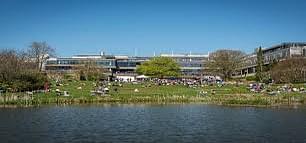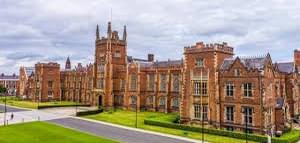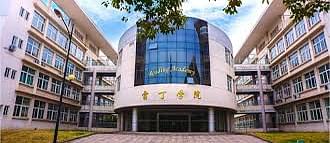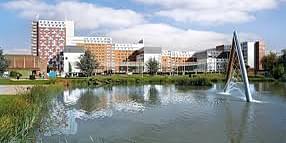£27,300/Yr
Tuition Fees
| Year | 1st Year Fees |
|---|---|
| Tuition Fees | £27300 (GBP 27300) |
Important Dates
No Deadline is available, students to enroll atleast 2 month prior the course starting date.
We supervise MPhil and PhD students whose interests match the expertise in these areas of biology:
Ecology and conservation:
Our Ecology and Conservation Research Group works to understand patterns observed in nature - species and habitats. This often includes anthropogenic effects.
We collaborate with a variety of organisations concerned with species and habitat conservation, including statutory responsibility. We work with research partners and conservation practitioners from the UK and across the globe.
Our research covers:
- genetics
- conservation
- human-wildlife interactions
- ecology
Biological, clinical and environmental systems modelling:
The Biological, clinical and environmental systems modelling group focuses on analysing the structure and dynamics of complex biological and clinical systems. We have a specific interest in investigating spatially and temporally heterogeneous processes. We are driven by practical problem solving through the use of modelling.
Applied and Environmental Biology:
We conduct research on organisms and processes of commercial and environmental importance. Our experimental approaches include:
- genomics
- molecular biology
- biochemistry
- physiology.
Some examples of the commercial applications we develop include:
- natural products discovery
- creation of novel antimicrobials and biopesticides
- sustainable methods of reducing food spoilage
- microbes involved in biofuel production
- uses of microbes in bioremediation of polluted environments
Learn more about the Applied and Environmental Biology group.
You can find more information about staff specialisms on the School of Natural and Environmental Sciences website.
We invite you to propose your own research topic, or you can follow one of the projects suggested on the School of Natural and Environmental SciencesÊwebsite. If you wish to develop your own research topic, you are recommended to contact a potential supervisor at the School of Natural and Environmental Sciences to develop your ideas, before submitting your formal application via the Applicant Portal.
You will benefit from two supervisors from our research community. You are encouraged to present your research results at our annual Postgraduate conference. You'll also benefit from training in a wide range of transferable skills, such as statistics and web design, through the Faculty of Science, Agriculture and Engineering (SAgE) Graduate School.
Industry:
The School of Natural and Environmental Sciences has good contacts with industry and hosts seminars and workshops, some of which are attended by visiting professors from industry. Biology students have the opportunity to participate at national and international conferences and to supplement their income by undertaking undergraduate laboratory demonstrating.Ê
Eligibility & Entry Requirement
Academic Eligibility:
- Students should have a high school degreAAB including Mathematics and one of Physics, Chemistry or Biology, and excluding General Studies and Critical Thinking.
- For Biology, Chemistry and Physics A Levels, we require a pass in the practical element.
- GCSE Physics or Dual Award Science (minimum grade B or 6) required if Physics not offered at a higher level.
- International Baccalaureate 34 points with Mathematics at Higher Level grade 6. Physics required at Standard Level grade 5 if not offered at Higher Level.
Indian Eligibility:
- Typically Newcastle recognizes an 80% average in Standard XII as comparable to AAB at A-Level.
- This can be awarded by:
- Central Board of Secondary Education (CBSE)
- Council for the Indian School Certificate (CISCE)
- National Institute of Open Schooling (NIOS)
- Various state boards
- Autonomous schools
- The actual grades required will vary depending on the exam board.
Along with the minimum eligibility requirements, tests required to study in the UK, international students hailing from non-English speaking countries need to prove English proficiency through IELTS/TOEFL/any equivalent test.
TOP Scholarships
| Scholarship name | Award amount | Eligibility |
|---|---|---|
| - | - | - |
| - | - | - |
| - | - | - |
Key Resources for Your Study Abroad Journey
Course Guides
Masters (MS) in UK: Top Universities, Fees, Requirements & Deadlines
Study MA in UK: Top Universities, Admissions, Fees, Scholarships, Jobs
Scholarship Grants & Financial Aids
| Name | Scholarship Per Student | Level of Study | Type | |
|---|---|---|---|---|
| Forktip Women’s- Innovation Scholarship | Scholarship per studentVariable Amount | Level Of StudyBachelor | TypeCollege-Specific | |
| Debesh Kamal Scholarship | Scholarship per student£ 1,385/Yr$1,385 | Level Of StudyBachelor | TypeMerit-Based | |
| Paul Foundation scholarships | Scholarship per student£ 20,174/Yr$20,174 | Level Of StudyDiploma | TypeMerit-Based | |
| Prodigy Finance-GyanDhan Scholarship | Scholarship per student£ 2,500/Yr$2,500 | Level Of StudyMaster | TypeMerit-Based | |
| Axol Science Scholarship | Scholarship per student£ 2,000/Yr$2,000 | Level Of StudyBachelor | TypeCompany-Sponsored | |
| Gyandhan Scholarship | Scholarship per student£ 1,222/Yr$1,222 | Level Of StudyMaster | TypeMerit-Based |
Similar Colleges


Robert Gordon University


University of Aberdeen


Aberystwyth University


University of Bath


Cranfield University


Queen's University Belfast


Ulster University


University of Reading


























Comments